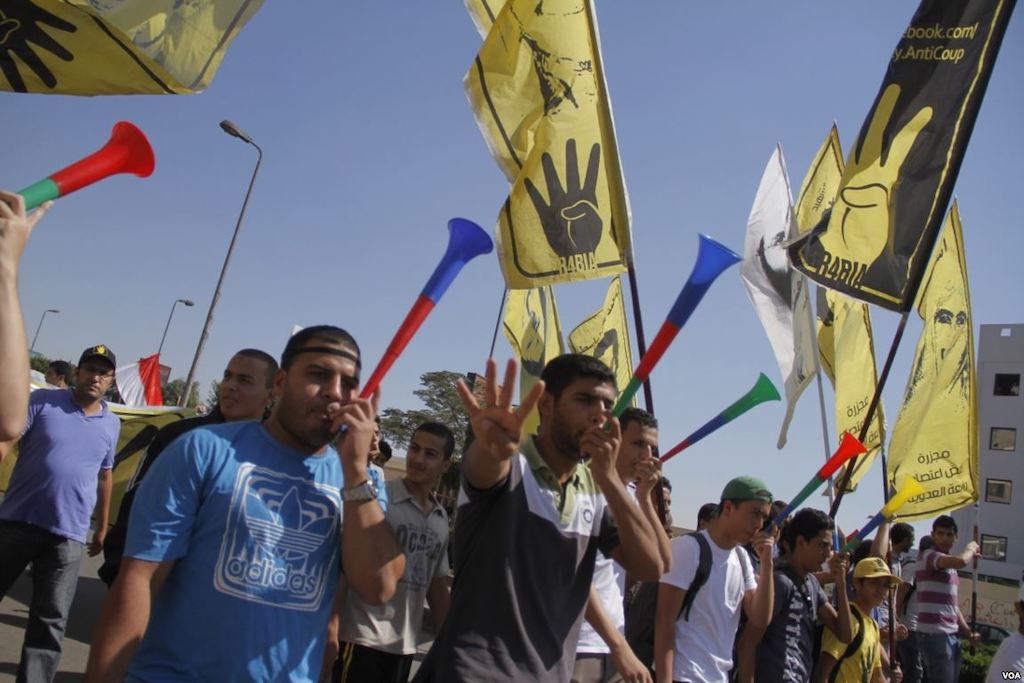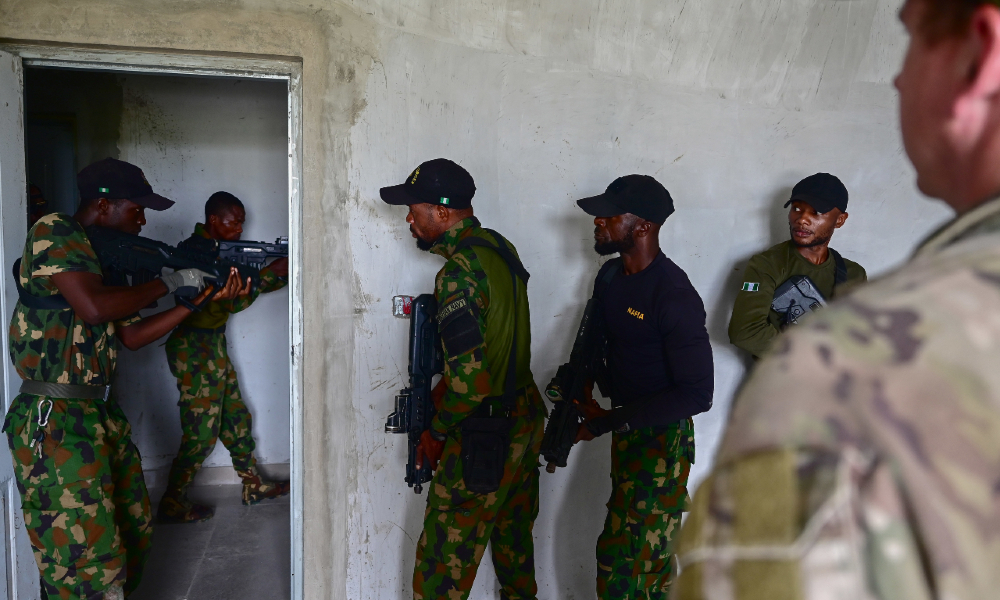How Trump Might Designate the Muslim Brotherhood as a Terrorist Organization
According to the New York Times, members of the Trump administration—including the president himself—are once again pushing to designate the Muslim Brotherhood as a terrorist organization, an idea that has been circulating among some of the president’s policy advisers for years.

Published by The Lawfare Institute
in Cooperation With

According to the New York Times, members of the Trump administration—including the president himself—are once again pushing to designate the Muslim Brotherhood as a terrorist organization, an idea that has been circulating among some of the president’s policy advisers for years. This most recent effort appears to be the result of an April 9 meeting between Trump and Egyptian President Abdel Fattah el-Sisi, who has helped lead a global campaign against the Muslim Brotherhood. Experts outside the government—and reportedly within it—have objected that such action would do little to advance counterterrorism efforts while alienating Muslims around the world and potentially harming Muslim organizations in the United States.
Most reports have thus far focused on the possibility that the Trump administration will try to designate the Muslim Brotherhood as a Foreign Terrorist Organization (FTO). While this has been the focus of similar legislative efforts, it’s unclear whether this is the only measure that the Trump administration is exploring. As William McCants and Benjamin Wittes explained on Lawfare in 2017, FTO status is a poor legal fit for the Muslim Brotherhood. For this reason, opponents of the Brotherhood have frequently steered officials toward other counterterrorism tools—including other terrorist designation regimes—that might be used to greater effect, particularly if wielded aggressively. If the president is truly determined to stigmatize and isolate the Muslim Brotherhood, then he is likely to try and use these other tools in lieu of or in addition to the FTO regime.
Much of the debate surrounding the Muslim Brotherhood centers on the nature of the organization itself. Opponents often characterize the group as part of a global campaign to radicalize adherents and push for a government dominated by Islamic law. Most experts, however, maintain that the reality is quite different. While there is an Egypt-based international Muslim Brotherhood organization, it is relatively inconsequential. Instead, the most significant components of the Muslim Brotherhood exist within its loose network of global affiliates, as Nathan Brown and Michelle Dunne describe:
There is no single thing called the Muslim Brotherhood, but instead a number of organizations, movements, parties, associations, and informal groups that take some inspiration, sometimes direct and sometimes remote, from the original movement founded in Egypt in 1928 and the core texts its founder produced. Brotherhood-inspired movements long ago concluded that their circumstances were so distinct that each would follow the path it saw as appropriate in its own society.... And there are many organizations that have been formed with varying degrees of participation from Brotherhood members, but their ties to any Brotherhood organization are often informal and vary in scope.
There are certainly groups affiliated with the Muslim Brotherhood that have engaged in terrorism, such as Hamas (which is already a designated FTO in its own right). But many other such groups have renounced violence, including any number of academic institutions and charitable organizations across the Islamic world as well as mainstream political parties in Iraq, Tunisia, Turkey and elsewhere. For this reason, experts argue that any effort at targeting the Muslim Brotherhood writ large is overbroad as it will inevitably encompass these relatively benign affiliates, some of whose activities actively advance other U.S. foreign policy objectives.
At a minimum, these characteristics make the Muslim Brotherhood a poor candidate for FTO designation. By statute, only foreign organizations that engage in, or retain the capacity and intent to engage in, terrorist activity that threatens U.S. nationals or U.S. national security can be designated as FTOs. On their face, these prerequisites disqualify nonviolent Muslim Brotherhood affiliates as well as those based in the United States. And it is unlikely that the actions of Hamas or other violent Muslim Brotherhood affiliates could justify the designation of nonviolent affiliates, as the violent group would have to “so dominate[] and control[]” the nonviolent affiliates than the two could “no longer be considered meaningfully independent.”
But the FTO regime isn’t the only—or even the most frequently used—terrorist designation in the United States. Shortly after the 9/11 attacks, President George W. Bush issued Executive Order 13224, which used the authorities delegated to him by the International Emergency Economic Powers Act (IEEPA) to set up a separate regime for designating so-called Specially Designated Global Terrorists (SDGTs). Designed to help combat terrorism financing, SDGT designation has similar consequences as FTO designation, including a freeze on the assets of SDGTs and a prohibition on providing them with various forms of support. Any U.S. persons or persons within the United States who engage in transactions that benefit SDGTs, including material support, may be punished with up to 20 years in prison—the same baseline penalty for those who provide material support to FTOs, though the latter restriction also applies extraterritorially.
The SDGT regime, however, has a much broader scope than the FTO regime. Any “foreign persons”—meaning both individuals and organizations—“that pose a significant risk of committing terrorism that threatens the national security, foreign policy, or economy of the United States” may be designated as an SDGT. (As a result, every FTO has also been dual-designated as an SDGT.) But so can any persons that are “owned or controlled by,” “act[ing] for or on behalf of,” “assist[ing] in, sponsor[ing], or provid[ing] financial, material, or technological support for, or financial or other services to or in support of,” or “otherwise associated with” another SDGT. This includes U.S. persons and those based in the United States, provided that a foreign state or national has “any interest” in them—a requirement that federal courts have interpreted broadly to include cases where a foreign national has a beneficiary interest or inhabits a leadership position. Consequently, entities several degrees removed from anyone with the intent or capacity to commit acts of terrorism can be designated as SDGTs so long as they have a qualifying relationship with another SDGT.
These qualifying relationships can encompass a broad range of conduct. Current federal regulations limit “financial, material, or technological support” to “any property” that is “tangible or intangible,” and define “otherwise associated with” in a manner that is largely redundant with the rest of Executive Order 13224. But they do not limit what it might mean to “assist,” “sponsor” or “provide ... other services to” an SDGT. In the context of material support for FTOs, the Supreme Court has upheld the position that “services” can be interpreted as constitutionally criminalizing activities as seemingly benign as advocacy and education so long as they are coordinated or directed by the FTO, on the logic that providing these services still frees up the FTO’s resources for terrorist activities. Extending this same logic to the SDGT regime—which at least one court has done—could make a wide array of collaboration and coordination a potential basis for SDGT designation.
Since 2001, the IEEPA has also permitted the federal government to apply provisional SDGT status to entities “during the pendency of an investigation,” prior to concluding whether that entity in fact qualifies. One U.S. organization remained in this status for more than two years before securing an injunction against full designation. In that case, a district court ultimately held that the scope and duration of the government’s action violated the Fourth Amendment but left open the possibility that provisional designation pending investigation could be constitutional if pursued differently.
This structure reflects that the SDGT regime is designed to take down not just individual terrorist organizations but also their networks of supporters and associates. This makes it a much more effective tool than the FTO regime for targeting any sort of network—including, potentially, the Muslim Brotherhood. Even nonviolent Muslim Brotherhood affiliates might be subject to SDGT designation if they maintain qualifying ties with certain violent affiliates. If these nonviolent affiliates are designated, then other affiliates will have to decide whether to sever qualifying relations with these groups or risk designation themselves. Qualifying relationships may well exist, especially as they could include any degree of cooperation and coordination on benign matters unrelated to terrorism, such as education programs and information exchanges, if the Trump administration were willing to interpret and apply relevant legal definitions aggressively. And severing these ties entirely may be difficult to do, given the cultural, historical and religious ties between certain Muslim Brotherhood affiliates. Moreover, while “pending investigation,” entities may at least temporarily be designated as SDGTs on the simple suspicion of such ties.
More importantly, unlike the FTO regime, these effects can reach entities in the United States, provided there is some foreign interest in them. This is rarely done but would not be unprecedented. Following the 9/11 attacks, authorities designated several major U.S.-based Islamic charities as SDGTs for allegedly providing support to Hamas and other terrorist groups. Civil liberties groups criticized these designations both for a lack of evidentiary basis and for having a chilling effect on Muslim Americans’ free exercise of religion, as these designations triggered concerns that donating to or coordinating with Islamic charities could expose individuals to legal consequences, including potential designation themselves. Any effort to target the Muslim Brotherhood domestically has the potential to trigger similar concerns, particularly as several prominent Muslim organizations in the United States are regularly accused of having ties to the Muslim Brotherhood.
Designated SDGTs will still be able to challenge their designations in federal court, but the prospects there are mixed at best. As SDGT designations lie “at the intersection of national security, foreign policy, and administrative law[,]” federal courts have generally applied an “extremely deferential” standard when reviewing the administrative record to see if the evidence is sufficient to sustain a designation. And while SDGTs with U.S. ties may pursue constitutional challenges, prior efforts have never reversed or overturned a designation, though they have successfully narrowed designation criteria, secured additional processes for designees and occasionally resulted in settlement. At a minimum, even successful legal challenges are likely to take substantial time to resolve. In the interim, the impact on designated entities—and the Muslim community more broadly—may be substantial.
The SDGT regime’s open-ended scope makes it an incredibly effective tool for combating terrorism financing. But it also puts the regime at risk of abuse, particularly if policy makers abandon their usual restraint and begin applying it to entities whose relationship with terrorism is far more attenuated. This makes the SDGT regime a more likely vehicle for the Trump administration’s ambitions against the Muslim Brotherhood than the FTO regime. And it leaves fewer clear legal barriers to resulting actions that might well compromise broader U.S. interests and values, both overseas and at home.


.jpeg?sfvrsn=96471529_5)


